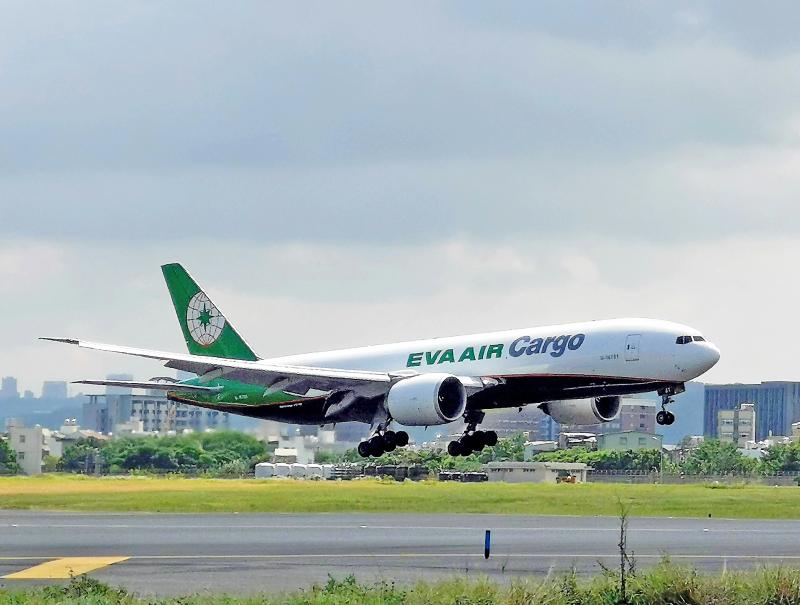EVA Airways Corp (長榮航空) and China Airlines Ltd (中華航空), the nation’s two major airlines, reported accelerated revenue growth in the third quarter compared with the previous two quarters, thanks to robust air cargo business.
EVA Airways yesterday said sales for last quarter rose 40 percent year-on-year to NT$25.81 billion (US$917 million), compared with an increase of 25 percent in the second quarter and a fall of 35 percent in the first quarter.
China Airlines said sales grew 39 percent to NT$34.6 billion in the third quarter, after gaining 10 percent in the second quarter and falling 14 percent in the first quarter.

Photo courtesy of Taoyuan International Airport Corp
EVA Airways said its cargo revenue totaled NT$20.58 billion in the third quarter, up 62 percent from NT$12.71 billion a year earlier, even though last month it had to halt its cargo service to Chicago as three of its pilots were infected with COVID-19.
The flight to Chicago was one of the airline’s busiest cargo routes with 22 flights a week before last month.
“The halt did not affect our cargo revenue, which still rose 64 percent last month, thanks to strong freight rates. The cargo business is forecast to continue booming this quarter,” an EVA Airways official said by telephone.
The airline’s passenger revenue rose in July and August, but retreated 16 percent year-on-year last month, due to lower demand and the suspension of flights to Chicago, the official said.
Overall, the airline’s passenger revenue totaled NT$2.47 billion last quarter, up 2 percent from a year earlier.
China Airlines said its cargo revenue hit a record of NT$11.68 billion last month, as it used more planes for flights to the US, which yield higher revenue.
In addition, cargo demand remained high, particularly shipments of fruit, electronic components and semiconductors, China Airlines said in a statement.
The cargo business is forecast to remain robust this quarter, which is the peak shopping season in Europe and North America, it said.

CHIP RACE: Three years of overbroad export controls drove foreign competitors to pursue their own AI chips, and ‘cost US taxpayers billions of dollars,’ Nvidia said China has figured out the US strategy for allowing it to buy Nvidia Corp’s H200s and is rejecting the artificial intelligence (AI) chip in favor of domestically developed semiconductors, White House AI adviser David Sacks said, citing news reports. US President Donald Trump on Monday said that he would allow shipments of Nvidia’s H200 chips to China, part of an administration effort backed by Sacks to challenge Chinese tech champions such as Huawei Technologies Co (華為) by bringing US competition to their home market. On Friday, Sacks signaled that he was uncertain about whether that approach would work. “They’re rejecting our chips,” Sacks

NATIONAL SECURITY: Intel’s testing of ACM tools despite US government control ‘highlights egregious gaps in US technology protection policies,’ a former official said Chipmaker Intel Corp has tested chipmaking tools this year from a toolmaker with deep roots in China and two overseas units that were targeted by US sanctions, according to two sources with direct knowledge of the matter. Intel, which fended off calls for its CEO’s resignation from US President Donald Trump in August over his alleged ties to China, got the tools from ACM Research Inc, a Fremont, California-based producer of chipmaking equipment. Two of ACM’s units, based in Shanghai and South Korea, were among a number of firms barred last year from receiving US technology over claims they have

It is challenging to build infrastructure in much of Europe. Constrained budgets and polarized politics tend to undermine long-term projects, forcing officials to react to emergencies rather than plan for the future. Not in Austria. Today, the country is to officially open its Koralmbahn tunnel, the 5.9 billion euro (US$6.9 billion) centerpiece of a groundbreaking new railway that will eventually run from Poland’s Baltic coast to the Adriatic Sea, transforming travel within Austria and positioning the Alpine nation at the forefront of logistics in Europe. “It is Austria’s biggest socio-economic experiment in over a century,” said Eric Kirschner, an economist at Graz-based Joanneum

BUBBLE? Only a handful of companies are seeing rapid revenue growth and higher valuations, and it is not enough to call the AI trend a transformation, an analyst said Artificial intelligence (AI) is entering a more challenging phase next year as companies move beyond experimentation and begin demanding clear financial returns from a technology that has delivered big gains to only a small group of early adopters, PricewaterhouseCoopers (PwC) Taiwan said yesterday. Most organizations have been able to justify AI investments through cost recovery or modest efficiency gains, but few have achieved meaningful revenue growth or long-term competitive advantage, the consultancy said in its 2026 AI Business Predictions report. This growing performance gap is forcing executives to reconsider how AI is deployed across their organizations, it said. “Many companies